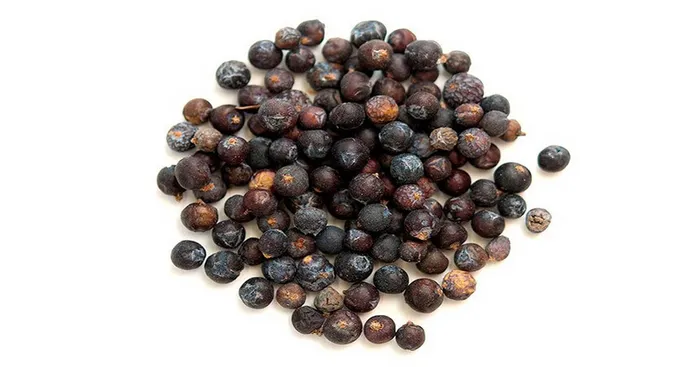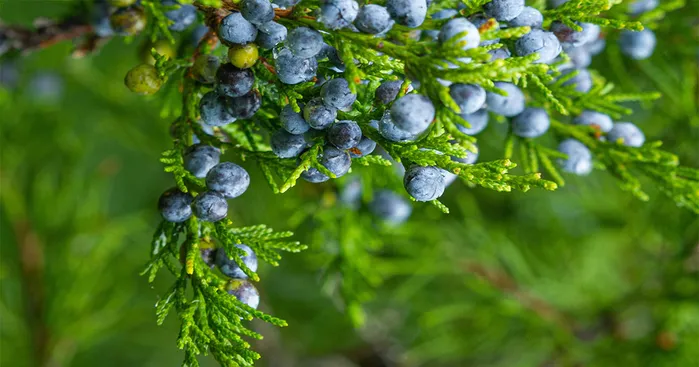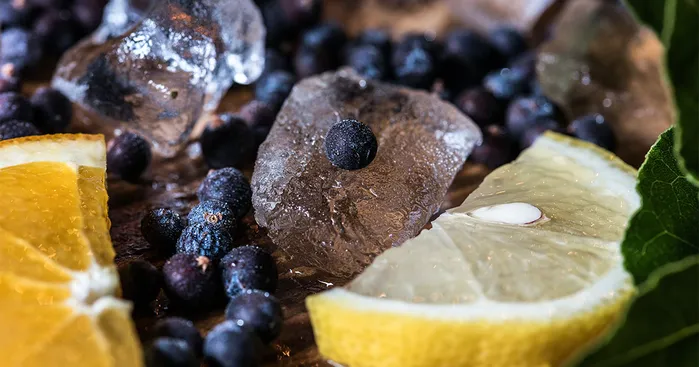Table of Contents

Juniper berries are not only a delicious addition to many dishes, but they also have some amazing health benefits.
These small, blue-black berries grow on evergreen shrubs and trees in many parts of the world.
They have a pine-like flavor and aroma that can enhance the taste of meats, sauces, soups, and even gin.
But did you know that juniper berries can also help you with digestion, inflammation, infections, and more?
In this blog post, we will explore some of the benefits of juniper berries and how you can use them in your daily life.
Read on to discover why juniper berries are more than just a spice!
General facts about juniper berries:

Overview:
juniper berries (Juniperus communis) is a versatile plant with a wide range of uses.
Its berries are used for both medicinal and culinary purposes, and they are also a key ingredient in gin and other spirits.
The juniper tree is native to Europe, North Asia, and North America, and it is also grown in Italy and Croatia for the extraction of its berries.
The plant is quite variable in its appearance, but it typically grows as a columnar shrub several meters in height.
The evergreen, needle-shaped leaves are arranged in trifoliate whorls on the branches, and they have a blue-white wax stripe on their upper side.
As for the juniper shrub is dioecious, meaning that there are separate male and female plants.
After pollination, the female flowers develop into berry-like fruits that exude the characteristic juniper smell, especially when rubbed.
These fruits are not true berries, but rather berry cones. When unripe, they are green, but they turn black and bluish-frosted when ripe.
They take two to three years to mature.
Juniper berries have a long history of medicinal use.
They have been used to treat a variety of ailments, including urinary tract infections, kidney stones, and digestive problems.
The berries are also a good source of antioxidants, which can help protect the body against damage from free radicals.
In the kitchen, juniper berries are used to add a distinctive flavor to a variety of dishes.
They are especially popular in European cuisine, where they are used to flavor meats, soups, stews, and sausages.
Juniper berries are also a key ingredient in gin, and they are sometimes used to flavor other spirits, such as Jenever and Steinhäger.
The common juniper is a fascinating plant with a wide range of uses.
Its berries are a valuable source of both food and medicine, and they are also a key ingredient in some of the world’s most popular spirits.
Random facts:

Gin is a spirit that is typically made with juniper berries, along with other botanicals. But what exactly is juniper, and why is it so important to gin?
Juniper Berries Are Not Berries
Juniper berries are not actually berries at all.
They are cones, similar to pine cones, but they are unusually juicy and fleshy.
The scientific name for juniper is Juniperus communis, and it is a member of the cypress family.
Junipers are tough, evergreen shrubs that are commonly found in the Northern Hemisphere.
The Word “Gin” Comes From the Word “Juniper”
The word “gin” comes from the Dutch word “jenever”, which is also the name of a traditional Dutch spirit that is flavored with juniper berries.
Jenever is thought to have originated in the 16th century, and it was originally used as a medicine.
Gin Isn’t the Only Juniper-Flavored Drink
In addition to gin, juniper berries are also used to flavor other alcoholic beverages, such as brandy and white wine.
In Finland, juniper is used to make a rye and juniper beer called sahti.
Juniper Has Many Other Uses
In addition to its use in alcoholic beverages, juniper has many other uses.
The berries can be used to make juniper berry oil, which has medicinal properties. Juniper berries can also be used in aromatherapy and perfumery.
In Europe, juniper is also used as a spice for flavoring and seasoning food.
What Does Juniper Taste Like?
The taste of juniper is difficult to describe. It has been described as “pine-like”, “botanical”, and “bitter herbs with hints of citrus”.
The taste of juniper can vary depending on the variety of juniper berries, the way it is processed, and the other botanicals that are used in the gin.
Origin of juniper berries name:
The name “juniper” comes from the Celtic word “juneprus,” meaning “acre.”
The saying “to be in a tangle” refers to the plant’s complex branches and thorny leaves, which can be a metaphor for a difficult or problematic situation.
The superstition behind juniper:
Juniper has a long history of folklore and superstition.
In one medieval legend, the plant was the only one to shelter the Holy Family during their flight to Egypt.
For this reason, the juniper was said to be blessed by the Virgin Mary and was believed to have the power to ward off witches and evil spirits.
An old remedy in the Romans:
Juniper branches were often hung on stable doors to protect livestock, and they were also burned as incense by the Greeks and Romans to purify the air.
The wood of the juniper tree was also used to make kitchen utensils, which would be infused with the plant’s sweet aroma.
Used in Japanese art:
In Japan, certain junipers (Juniperus rigida and Juniperus chinensis) are used in the art of bonsai, where they are trained to create highly original and bold shapes.
Juniper berries health benefits:

Improves digestion:
Bitter substances like juniper stimulate the production of saliva, gastrointestinal enzymes, and gastric acid secretions.
This helps break down food more quickly and efficiently, which can relieve heartburn and indigestion.
Juniper berries can also help reduce bloating, which can relieve pain and discomfort.
If you are looking for a natural way to improve your digestion, juniper berries may be a good option for you.
You can add them to your food, make tea with them, or take them as a supplement.
However, it is important to talk to your doctor before taking juniper berries, as they can interact with certain medications.
A natural diuretic:
The University of Michigan notes that juniper berries are a diuretic, meaning they increase urine output.
This can be helpful for people who are trying to reduce excess water weight, which can be caused by factors such as eating too much salt, inflammation, or injury.
In addition to their diuretic properties, juniper berries also have antimicrobial and antifungal properties.
This means they can help fight off bacteria and fungi that can cause urinary tract infections.
If you are looking for a natural way to reduce bloating and water retention, juniper berries may be a good option for you.
However, it is important to note that juniper berries can have side effects, such as stomach upset and diarrhea.
If you are pregnant or breastfeeding, you should not take juniper berries.
Promotes heart health:
Juniper berries are a type of berry that has been shown to have potential heart health benefits.
In a study in rats with diabetes, juniper berry extract was shown to reduce total cholesterol and triglyceride levels by 57% and 37%, respectively.
Another study in rats found that juniper berry extract also increased HDL cholesterol levels.
Although there are no human studies on the effects of juniper berries on heart health, research shows that eating berries is an excellent way to reduce risk factors for heart disease.
However, more research is needed to confirm the effects of juniper berries on heart health in humans.
Full of antimicrobial and antioxidant properties:
Juniper berries are not only antioxidants, but they may also have antibacterial properties.
A German study published in 2010 in the journal “Natural Items Interactions” found that juniper oil has antibacterial activity against a variety of bacteria, including those that cause food poisoning and infections in animals and plants.
The specific compounds in juniper berries that have antibacterial activity are sabinene, limonene, myrcene, and alpha- and beta-pinene.
The antibacterial activity of juniper berries has been studied against both Gram-positive and Gram-negative bacteria.
Juniper berries have been used traditionally to treat a variety of infections, including urinary tract infections, kidney infections, and skin infections.
In addition to the antibacterial properties of juniper berries, they also have antioxidant properties.
Antioxidants help to protect the body from damage caused by free radicals.
Free radicals are unstable molecules that can damage cells and tissues.
Antioxidants can help to neutralize free radicals and prevent them from causing damage.
The antibacterial and antioxidant properties of juniper berries make them a potential natural remedy for a variety of health conditions.
However, more research is needed to confirm the effectiveness of juniper berries for these conditions.
Offers anti-aging properties:
Juniper berries are a natural tonic for the respiratory, digestive, and excretory systems.
They can help you look and feel more youthful by supporting a healthy mind and body.
However, juniper berries can also have some side effects, such as allergic reactions, itching, swelling, skin irritation, and difficulty breathing.
If you are taking lithium medications, you should not eat juniper berries, as they can react negatively with lithium.
Additionally, high consumption of juniper berries can lead to diarrhea, cramps, or DNA damage.
It is important to be aware of the potential side effects of juniper berries before consuming them.
If you have any concerns, you should talk to your doctor.
Lowers blood sugar levels:
A 1994 study published in the journal Planta Medica found that juniper berries can lower blood sugar levels.
The study, led by Fermin Sánchez de Medina of the Universidad de Granada in Spain, showed that juniper berries improve the secretion of glucose-induced insulin.
This means that the berries help the body to use insulin more effectively, which can lead to lower blood sugar levels.
The study was conducted in rats, and the researchers found that when the rats were given juniper berries along with a synthetically induced increase in blood sugar, the berries caused a significant drop in glucose levels.
This suggests that juniper berries could have a similar effect on humans.
However, it is important to note that this study was conducted in rats, and more research is needed to confirm the effects of juniper berries on humans.
Additionally, it is important to talk to your doctor before taking any supplements, including juniper berries, as they can interact with other medications.
Precautions before you consume juniper berries:

The use of juniper internally should be limited to a maximum of four to six weeks, according to some experts.
Others recommend a maximum of three weeks.
To avoid kidney irritation and damage, it is important to follow the duration of use recommended in the product information or by your doctor or pharmacist.
The simultaneous use of juniper with synthetic diuretics is not recommended.
A violet-like smell of urine indicates an overdose.
When using juniper oil or other essential oils, it is important to use only 100% natural essential oils, preferably those obtained from organically grown plants or wild collections.
Here are the people that should avoid consuming juniper berries:
- Pregnant women and people with inflammatory kidney disease should not use juniper internally.
Breastfeeding women and children and adolescents under the age of 18 should also avoid using juniper medicinally, as there are currently no (sufficient) studies on its safety for these groups of people. - Diabetes: Juniper berries can lower blood sugar levels.
This could be a problem for people with diabetes who are taking medication to control their blood sugar.
If you have diabetes, talk to your doctor before taking juniper berries. - Diseases of the stomach and digestive tract: Juniper berries can irritate the stomach and intestines.
This could worsen symptoms of conditions such as ulcers, gastritis, and irritable bowel syndrome.
If you have any of these conditions, talk to your doctor before taking juniper berries. - High blood pressure: Juniper berries can affect blood pressure.
If you have high blood pressure, talk to your doctor before taking juniper berries. - Surgical treatment: Juniper berries can affect blood sugar levels.
This could make it difficult to control blood sugar levels during and after surgery.
If you are scheduled for surgery, talk to your doctor about whether you should stop taking juniper berries before the surgery.
Using juniper berries:

Unlike other berries, juniper berries are usually used only in small quantities to flavor food and are not eaten in large portions.
They have a tart, pine-like flavor that makes them a popular ingredient for seasoning recipes and infusing drinks.
Juniper berries are used, for example, to flavor marinades and spice mixtures and give the gin its unmistakable taste.
They are usually sold dried – either whole or crushed – but can also be bought fresh.
Keep in mind that there are many types of juniper and not all of them are edible. The berries of Juniperus communis are most commonly used for culinary purposes (22).
Juniper berry essential oil is also used in aromatherapy and is said to have a calming effect. Remember that essential oils should not be ingested.
In addition, you can buy juniper berry tea in tea bags or prepare it at home from crushed juniper berries.
